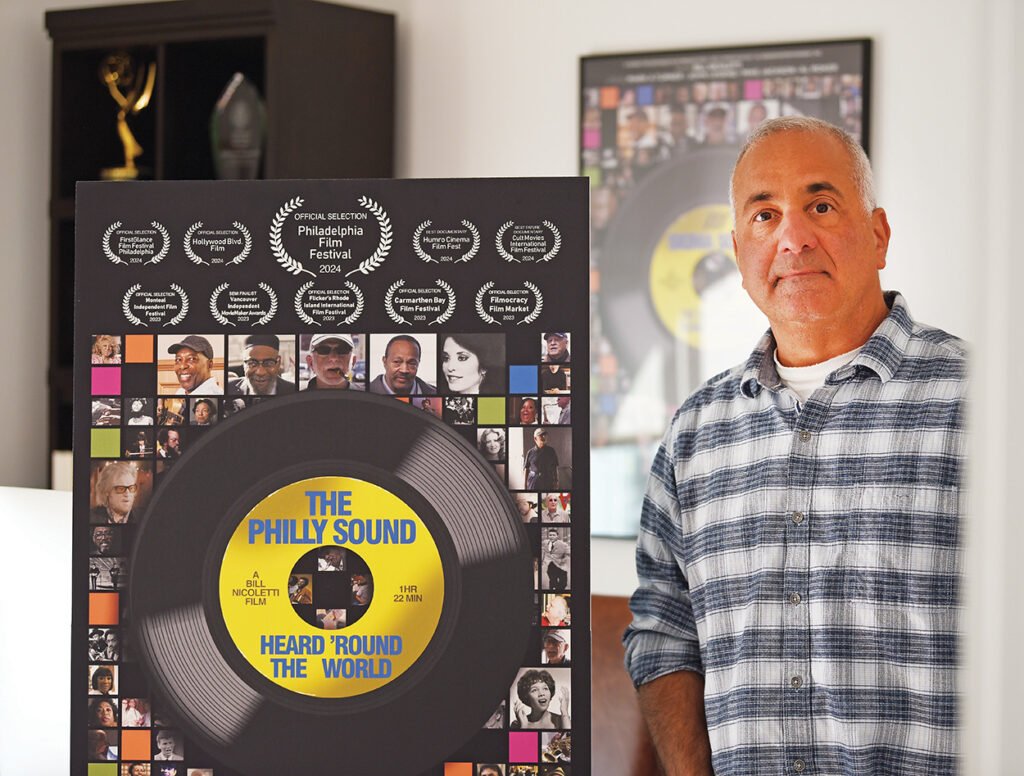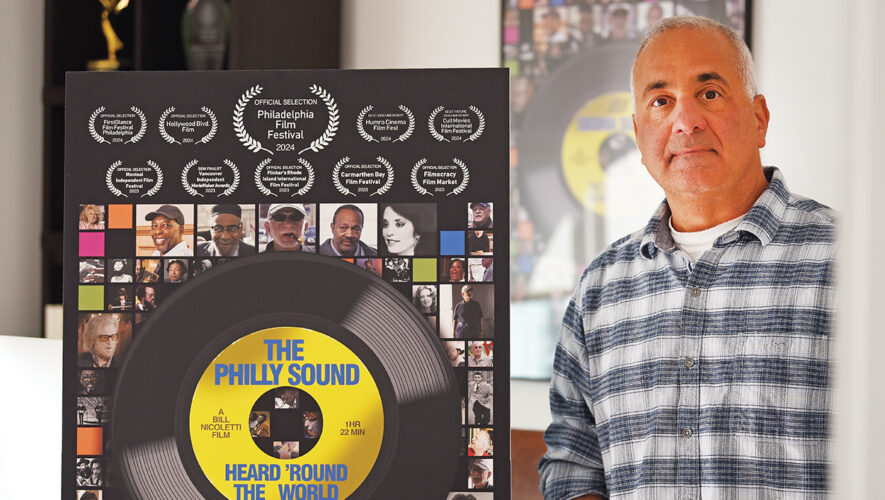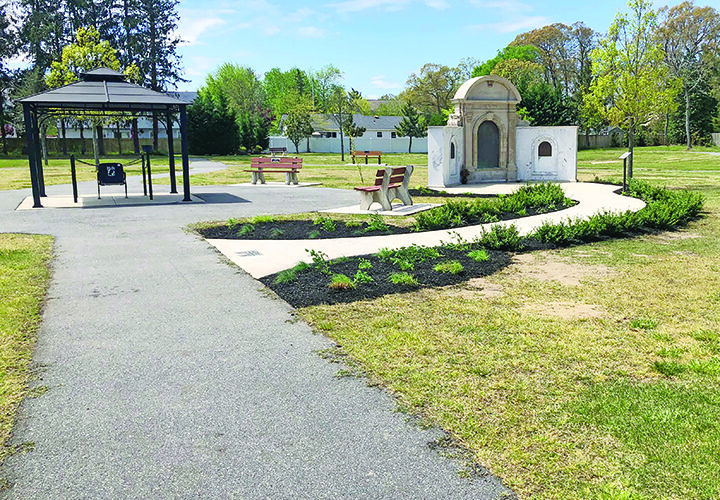Film being screened this week at Philadelphia Film Festival
OCEAN CITY — The Philly Sound. The O’Jays. The Spinners. David Bowie. Hall and Oates. “Back Stabbers.” “Love Train.” “I’ll Be Around.” “Could It Be I’m Falling in Love.” “Young Americans.”
Ocean City resident Bill Nicoletti has spent a decade on a project dedicated to the music that came out of great collaborations at the legendary Sigma Sound Studios in Philadelphia that belied the turbulent ’60s when it was founded. This week he presents it in screenings at the Philadelphia Film Festival with the hope it leads to a much wider audience.
“The Philly Sound Heard ’Round The World” with a Q&A with Nicoletti and editor Dexter Gresh to follow are at 1:15 p.m. Wednesday, Oct. 23, at the Film Society Bourse and 10:15 p.m. Friday, Oct. 25, at the Film Society Center in Philadelphia.
The film’s Friday night showing closes the festival, which he said is exactly where he wants the “pick-me-up” kind of film. He hopes it sparks something because he believes it is important for Philadelphia and beyond.
“For me, as the filmmaker who’s been through this now for 10 years, when I wake up Saturday morning I don’t know if we’re yesterday’s news now or if this thing catches some lightning in a bottle and someone saw what we’re doing and wants to be the hero here.”
Finding a major backer for the film, he said, “would be a beautiful thing for Philadelphia. This would be a great thing for our city, first and foremost, and surrounding area.
“This is a ‘Rocky’ kind of film about a real place and time in history. Everyone in this film is an underdog who became a champion. They are very humble, they’re very grounded, very likable. No one talks down to you. Everyone is relatable. I think everyone puts their heart out on their sleeve.”
This is Nicoletti’s second music documentary. He directed and produced “Once in a Hundred Years: The Life and Legacy of Marian Anderson,” a Philadelphia native who was the first African-American soloist to perform at the Metropolitan Opera.
“The Philly Sound Heard ’Round The World” is packed with interviews of musicians and the people who are the pillars of Sigma Sound Studios, including founder Joe Tarsia. The interviews include Daryl Hall and John Oates, John Legend (one of the producers on the film), Patti LaBelle, Jerry Blavat, Bobby Rydell, Todd Rundgren, The Trammps, Christian McBride, O’Jays, Delfonics, Stylistics and Soul Survivors and many more.
He also has interviews with the people behind the music — Tarsia, Thom Bell, Kenny Gamble and Leon Huff.
“It’s a joy ride type of film. You’re getting all these stories that connect but work on their own,” he said.

Although there are many names music fans will recognize, Nicoletti said Philadelphia is more renowned for its sound than for its stars.
“Sure, we had Patti LaBelle and Teddy Pendergrass, but it wasn’t Motown,” he said. “The music, in my opinion, rivaled or eclipsed all of that music and a lot had to do with Sigma Sound, that was the studio, the revolutionary studio where the technology is still being used today … that Joe (Tarsia) invented.”
Asked to define the sound, he replied, “If you ask 10 people who know Philly music, you might get 10 different answers.” He called it “a very sophisticated R&B sound with very rich, lush strings.”
“It’s anything Tommy Bell attached himself to, which was the Spinners, the Stylistics, so much amazing arrangements in those songs. They’re not just ordinary pop songs. If you listen to ‘I’ll Be Around,’ ‘You Are Everything,’ Tommy Bell’s music was so sophisticated people didn’t really know they were being exposed to classical music and appreciating classical music.
“And I look at Linda Creed, another name people wouldn’t know, the writer of all these beautiful lyrics. She was a poet, a very young girl who was a phenomenal writer who teamed up with Tommy Bell,” he said.
Stars in alignment
Tarsia, an engineer, founded the studio in 1968, when a diverse group of people came together in a time of racial strife. But what was happening outside the studio did not mirror what was going on inside.
“A lot of stars were in alignment, as Joe says in the film. Kenny (Gamble) was a phenomenal songwriter, Leon Huff was an amazing musician, Joe was really a cutting-edge engineer and Tommy (Bell), forget it, he was like Henry Mancini, he was as high-end as any composer or arranger that has ever walked the planet. Really a genius.
“You had all these different backgrounds and influences that came together and then you had Linda Creed’s lyrics,” he added.
Creed’s songwriting credits include “The Greatest Love of All,” “You Are Everything,” “Betcha by Golly, Wow,” “The Rubberband Man” “You Make Me Feel Brand New.” Sadly, she died of breast cancer at age 37 in 1986.
“If they all did it on their own, none of it would have been the same. They needed each other,” Nicoletti said. “They all would have been successful, but the combination of the four of them together really created something special. And then you put Linda Creed in there and then it’s just a whole different thing.”
The interviews
Although music fills the documentary — “the film is wall to wall music,” he said (and he isn’t exaggerating) — the interviews Nicoletti features are not about the making of the songs, but the human experience behind them.
Asked about some of his favorite interviews, Nicoletti points to Daryl Hall and to Eddie Levert and Walter Williams of the O’Jays, known for hits including “Love Train,” “Back Stabbers,” “For the Love of Money” and “Use ta be My Girl.”
Levert and Williams “really caught me off guard as far as how protective they were of their craft, how funny they were. They played off of each other. And because of that it set the tone for a really fun interview.”
Because he used an incorrect source in his due diligence before the interview, he had some of his facts wrong. “And they jumped all over me. And that, for me, I’m a Philly guy, that was fun. … We were now messin’ with each other. And because of that there was a lot of ribbing that went on through that interview that you wouldn’t expect in the making of a film.
“The O’Jays were really fun. When you watch the film you’ll see an opening line that they gave that came out of nowhere. That always gets a great response from people. That in itself was really fun,” he added.
The most memorable interview was Hall. It took him five years to nail the elusive musician down, but when he did, it went far beyond Nicoletti’s expectations. (He also interviewed John Oates, “like a total historian on Philadelphia music.”)
Nicoletti was warned that Hall would be all business so he had some trepidations going in, combined with the fact he got some bad news at the time about funding for his movie on his way to the interview.
Nicoletti thought, “This is so bittersweet. I’m getting the interview I always wanted. I don’t know what my next steps are once I’m done with this interview.”
Once he met Hall, they quickly struck up a rapport.
“He comes right in, comes right up to me and says, ‘You’re Bill, right? Hey man, thanks for coming.’ It wasn’t what he expected.
“Even though I was at my lowest point, he just sees me as a peer and he’s treating me with that respect and I really appreciated that.”
And then he gave Nicoletti a nearly two-hour interview.
“It was phenomenal and he was brilliant. We laughed a lot, which is something I always want, because they’re getting comfortable, they’re loosening up, they might get a little vulnerable. He gave me so much information that I use throughout the whole film.
“My intention with Daryl Hall was to get what I needed for Act One, the early stuff. I had no idea he was going to give me content I could use throughout the whole film,” he said.
That, the filmmaker added, is an example of how his film got better than his original version, which had more content about the making of the songs, but he had to change after he was denied use of 30 songs in the film that had earlier been tacitly approved. (See related story on the long, complicated path of getting the film made.)
As an example, Nicoletti originally planned to use “The Rubberband Man” playing over the credits at the end, which details “where everyone went on with their lives,” but that was one of the songs denied. His editor suggested Elton John’s “Philadelphia Freedom,” but he felt that had been overused. However, it gave him another idea — a cover of “Philadelphia Freedom” by a Philadelphia artist.
He found a cover by Daryl Hall “that is phenomenal.
“Unless you know Daryl’s voice — we don’t say it’s Daryl Hall — but it’s a really cool version of ‘Philadelphia Freedom’ that sounds really good and maybe you’ll get it or maybe you won’t, but because it’s Daryl Hall singing at the end of the film, it couldn’t be more perfect.”
More information about the film festival at filmadelphia.org.
– STORY and PHOTO by DAVID NAHAN/Sentinel staff



